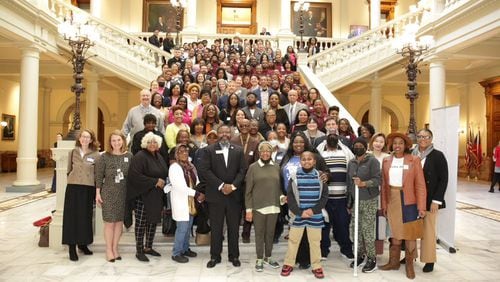Dozens of housing advocates came together Wednesday at the statehouse to persuade lawmakers to pass a bill that would create modest protections for renters.
With the end of the legislative session in sight, the advocacy group Georgia Advancing Communities Together, or Georgia ACT, organized what was called “Housing Day at the Capitol.” Advocates were encouraged to make their voices heard on two bills on housing affordability, including House Bill 404, or the Safe at Home Act.
During a morning briefing at the Central Presbyterian Church in downtown Atlanta, attorney and public policy advocate Elizabeth Appley urged advocates to help push the bill across the finish line. The Senate is expected to vote on the legislation before the March 28 deadline.
The bill passed the House unanimously in 2023 and the Senate Judiciary Committee approved it in February. It would provide basic tenant protections, including a human habitability standard, a three-day grace period before landlords can file for eviction, and also caps refundable security deposits at two months’ rent.
Appley, who has advocated for the bill, said she was “cautiously optimistic” it will pass but asked attendees to help put the matter beyond doubt.
“This bill is not everything we need to keep families safely and stably housed. But it is an important step forward and the lawyers who do this work tell me that it will help tenants in significant ways,” she said.
In addition to the Safe at Home Act, Appley encouraged advocates to voice opposition to House Bill 1182, which would cut the state’s low-income tax credit. Appley said that amid a housing crisis the tax credit is the only state funding to build or maintain affordable housing for low-income people.
“If they don’t pass anything, the program would remain at 100% funding. So that would be the best outcome,” she said.
After the briefing, dozens of advocates headed over to the Capitol building.
Among those walking across its marbled floors was Miracle Fletcher, who recently gave harrowing testimony at a Senate Human Rights Subcommittee hearing in Roswell about the deplorable conditions she experienced at Trestletree Village apartments in Atlanta.
The tenant organizer and advocate said that raw sewage had flooded her unit. The complex featured in The Atlanta Journal-Constitution’s investigative series, “Dangerous Dwellings.”
Fletcher said she spends the bulk of her income on her $1600-a-month rent. HB 404 has given some housing advocates pause because it does not define “fit for human habitation.” Although Fletcher believes it does not go far enough to shield tenants from unscrupulous landlords, she said it was “better than nothing.”
“This advocacy never stops. Organizing never stops. Just don’t give up. When your roof is caving in and roaches are everywhere and you just feel like you don’t have anybody … somebody is here,” she said. “I’m listening.”
Dr. Bambie Hayes-Brown, president and CEO of Georgia ACT, said more than 200 people had registered for the event, including more than 60 students.
Students from Dougherty High School in Albany, Georgia filed onto a bus before dawn to take the three-hour trip to Atlanta.
Student Kisah Brown said she relished the opportunity to learn how to advocate. Laila Hunter added that the trip had taught her something about the mechanics of state government. Meanwhile, Isaiah Johnson said if he got the opportunity to talk to lawmakers, he would talk about gentrification, property taxes and blighted homes.
“Our legislators need to do something about it to ensure the prosperity of the people of Georgia,” he said.
About the Author







